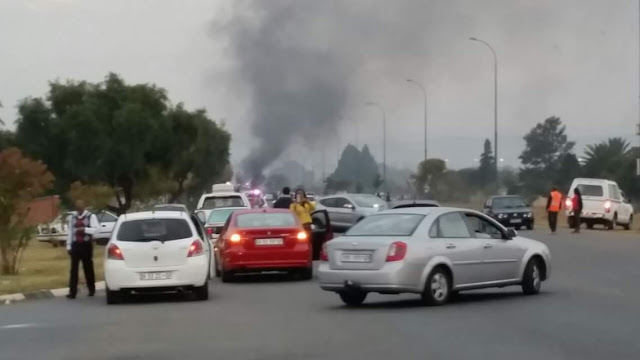Thursday, May 26, 2016
VIOLENCE HAS BECOME PART OF OUR CULTURE, SAY POLITICAL ANALYSTS IN RESPONSE TO THE VIOLENT PROTESTS TAKING PLACE IN SOUTH AFRICA ON A DAILY BASIS.
(The chaos and lawlessness that took place at Ennerdale in Johannesburg on Thursday, May 26 2016)
By Subry Govender
(Political science lecturer and analyst - Zakhele Ndlovu)
“We have developed this culture where every time we are unhappy about something we resort to violence. It’s been like that for decades now.”
This is how a South African political science lecturer and analyst, Zakhele Ndlovu, describes the ongoing violent protests that are currently plaguing South Africa on a daily basis.
I spoke to Ndlovu at his offices at the University of KwaZulu-Natal in the coastal city of Durban soon after the burning of 24 schools in the Vuwani area of the Limpopo province – north of Pretoria where residents were protesting against their region being incorporated into another municipal authority.
(The mayhem at Ennerdale on Thursday, May 26 2016)
Since the tragic burning of schools, disgruntled students destroyed and set alight libraries and halls and vandalised university properties at the universities of Johannesburg and historical Fort Hare in the town of Alice in the second week of May. The violent student protests at Fort Hare took place at a time when the institution was celebrating its 100th anniversary.
Violent protestors also went on the rampage in several parts of the country - setting alight community halls and clinics; attacked and looted shops; set up road blocks with burning tyres and generally clashed with the police.
So far this year alone there have been more than 80 violent protests by communities and students at universities. In the latest violent protests starting in the fourth week of May on May 23 violent protestors took to the streets in Hammanskraal – north of Pretoria; Ennerdale in Johannesburg and several towns in the north and south of Durban. The protestors set up road blocks with burning tyres and generally causing mayhem.
What are the reasons for the violence and chaos?
Ndlovu said while the violence could not be condoned, it seemed that many communities had become frustrated at the slow pace of change in the quality of their lives.
“I think the first one and probably the most obvious one is that there is a certain level of frustration because many people believe that the basic services are not being delivered. But that is not an excuse to resort to violence. They can use other mechanisms to deal with that,” he said.
(Political scientist and analyst - Lubna Nadvi)
A social and political scientist who has been monitoring the upsurge in violent protests in South Africa is Dr Lubna Nadvi. She’s of the firm view that the lack of strong political and moral leadership is also one of the reasons for protestors resorting to violence.
“I think if our President and the top level of leadership,” she said, “showed the ethics and the morals that are expected of leadership at that level then the people will actually think twice about engaging in lawless behaviour”. She added: “When they observe that our President is behaving in ways that are illegal and corrupt and see him getting away with it, the message that comes across very clearly is that well if the President can do it, then we can too.”
The South African Government has literally been caught with its pants down with the latest wave of violent protests that are sweeping the country. But it seems that it is not prepared to accept any responsibility for the upsurge in violent protests.
A government leader in the Gauteng Province in Johannesburg, Nandi Mayathula Khoza, has simply white-washed the violent protests as the work of opportunistic groups.
“We are concerned that this violence is tantamount to intimidation in the season of elections and this is something that must not be allowed in our 20 years of democracy,” she said.
(Chaos and mayhem at Ennerdale in Johannesburg ion Thursday, May 26 2016)
But political analysts and observors say that more than strong arm police and security actions – there’s an urgent need for literacy about South Africa’s new democracy.
Dr Lubna Nadvi said she was not certain whether in 22 years of freedom political role players and others had done much to promote literacy about democracy.
“I think that because of the history of structural segregation that the people who are living in the rural areas who are now moving to urban and semi-urban areas have not been exposed to what democracy is really all about,” she said.
“I think there are still gaps in terms of understanding the business of participatory democracy, how you can people engage in debates and discussions. We need to do more to educate people that they don’t have to be violent and they don’t have to throw rocks and stones to be heard. They can perhaps engage in you know the kind of engagement that is not destructive that is going to produce some kind of constructive outcome.”
(Violent protest at Ennerdale in Johannesburg on Thursday, May 26 2016)
There’s no doubt that the continuing violent protests is of serious concern to all role players in the country. The common thought among most people is that while perpetrators of violence must face the full might of the law – at the same time constructive engagement must also take place with communities in order to meet their demands for basic social and economic facilities. – ends – Subry Govender May 25 2016







No comments:
Post a Comment